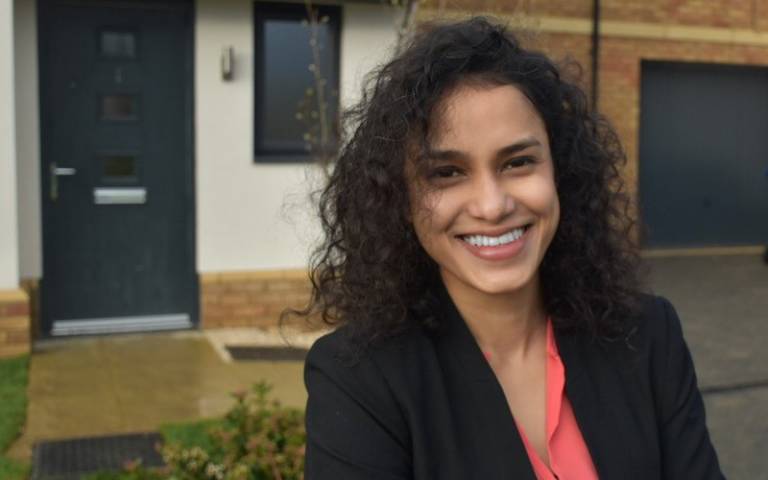Marlene Elisa Da Vitoria Lobo

To mark International Day of Women and Girls in Science and International Women's Day, we caught up with Marlene to ask her about her research, her role models and her goals for the future.
What sparked your interest in ophthalmology?
Diabetes is a serious illness which results in a number of complications. On such complication resulting in blindness is diabetic retinopathy, which affects the neurovascular components in the retina. I wanted to continue my work on understanding the neurovascular complications of diabetes in the central nervous system which directed my journey to the retina. I find the complexity of the retina mesmerising, a tissue with much likeness to the brain, yet unique in itself. Deciphering the key mechanisms and how the interplay between the neural and vascular results in diabetic retinopathy grabbed my attention, thus I decided to pursue a PhD at the Institute of Ophthalmology. The thing I enjoy most about science is the freedom to explore, to be curious, to venture into the unknown.
You are also interested in programming/deep learning – can you tell us about that?
My awareness and interest in the application of programming came out of my project but were turbocharged during the COVID-19 lockdown. Often as biologists we are trained to focus on short-term goals and we fail to appreciate the richness of avenues such as programming and deep learning. During the lockdown, while I was doing my analysis, I grew tired of the repetitive nature of standard analyses. Subsequently, I decided to explore Python to automate my analysis to develop new image analysis tools. The last couple of months have been a steep learning curve, and my appetite to dig deeper using more sophisticated avenues such as deep-learning has grown. Programming for me started out as a hobby, but now has become one of the most enjoyable parts of my PhD.
Can you tell us about your current research?
My current research rests on the interface of biology, medicine and data science. Using animal models of diabetic retinopathy, I aim to understand the key early pathological events that occur in the retinal vasculature. In a normal retina, vessel homeostasis is maintained by a tight regulation of the neurovascular unit. A key cell type involved is the pericyte, which forms a bridge between the vascular and neuronal components of the eye. Additionally, these pericytes maintain normal vessel function preventing the vessels from becoming leaky. In the later stages of diabetic retinopathy these cells are lost resulting in a dysfunctional vessel wall. My goal is to understand when these cells first start showing pathological changes using high resolution microscopy and mapping these with deep learning algorithms. Through my project I hope to reach a point where the tools that I develop can be made available to life sciences researchers and aid in the enhancement of scientific research.
What do you hope to do after you’ve completed your PhD?
In an ideal world, I would like to amalgamate my clinical, research and programming skills to develop effective and easily accessible tools to assist in disease diagnosis and scientific discoveries. I also have interests in teaching and science communication. There are many paths I may take, but I hope whichever path I take, I continue to contribute towards the upliftment of the scientific community and improving health outcomes.
In comparison to males, there is still a low number of females in the scientific community. What would you say to young girls who want to work in science/research?
The plain truth is, like any career, women have to work twice as hard to progress. Do not let this deter you. A career in science has its ups and downs, celebrate the ups and be kind to yourself during the downs. Perseverance is key, keep learning, take risks, learn from your mistakes and continue expanding your skill set. Most importantly believe in yourself.
Who is your female role model and why?
Honestly, it is hard to think of only one! As I grow older and a little wiser (I hope), I have begun to understand each women’s experiences and circumstances are unique. Every women I cross paths with or read about has inspired me in one way or another. Each one has an empowering story to tell, a journey to admire, a strength that is unbreakable.
What superpower would you pick and why?
Given the current situation, teleportation would be a great power to have. For multiple reasons such as saving time, avoiding crowded public transport and most importantly the possibility of seeing my family who are more than 7500 km away.
Do you have any skills or talents that most people don’t know about?
I enjoy music and dance. I play the violin and piano occasionally. I also trained in the Indian classical dance style of Bharatanatyam, and was awarded my first degree at the age of 15. Apart from the arts, I enjoy foraging and exploring for different plant species that grow in the wild.
What is your favourite thing to do in your spare time?
In my spare time I enjoy volunteering as a supervisor at the Nuffield Foundation, a foundation built to provide research opportunities to students from low socio-economic backgrounds. Here, I guide and teach these students, helping them build scientific skills. Working with these students gives me great happiness as I watch them grow as budding scientists. I also volunteer as a STEM ambassador to mentor young people who aspire to pursue careers in STEM.
What’s a goal you have for yourself that you want to accomplish in the next year?
By the end of the year I hope to be swimming in heaps of data like any other PhD student, more realistically, I hope to have completed my tool development and be in a position to connect the dots in preparation for my thesis.
 Close
Close

